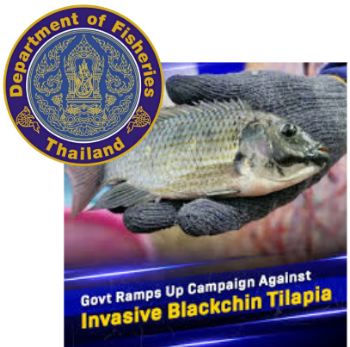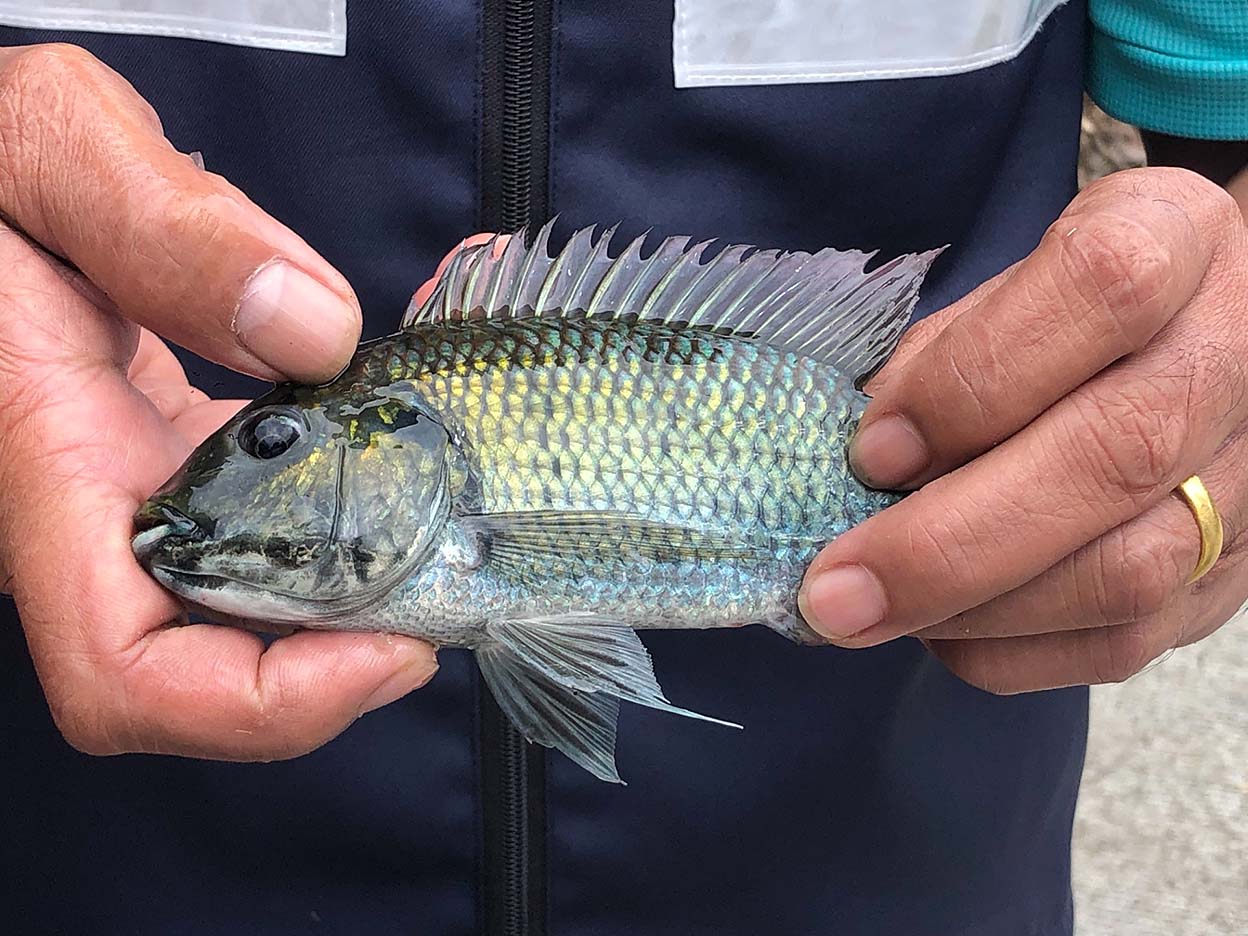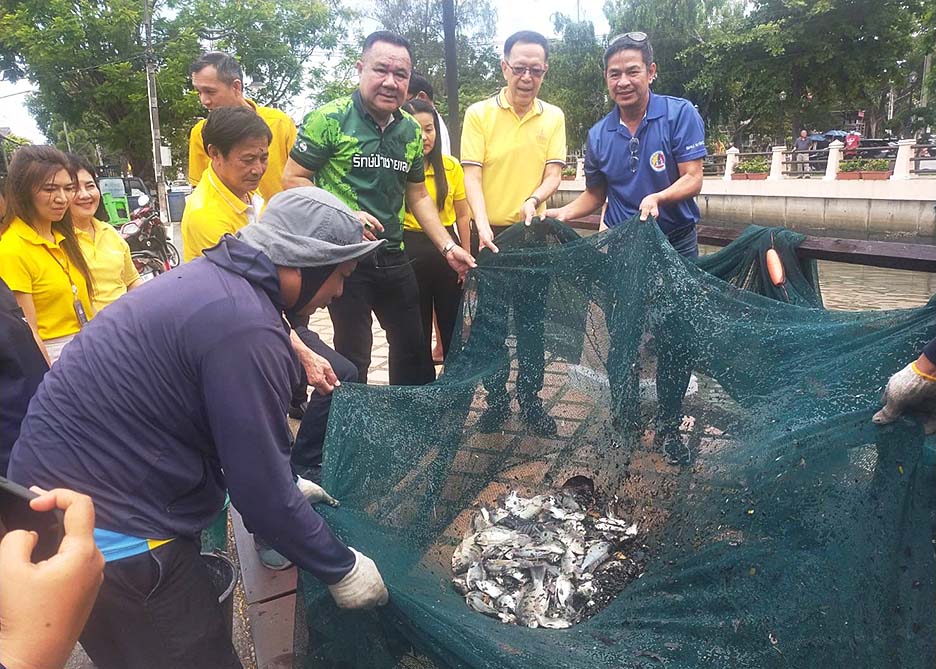|

Blackchin tilapia, a species that has been making waves – quite literally – across the country’s marine ecosystem.
Thailand’s Battle Against Invasive Blackchin Tilapia
 THAILAND
THAILAND
Monday, August 12, 2024, 15:00 (GMT + 9)
The elusive Blackchin tilapia (Sarotherodon melanotheron), a fish that has recently been placed at the center of a significant environmental campaign launched by Thailand’s Department of Fisheries.

The Blackchin tilapia, has recently lost its distinctive coloration
The reason behind this campaign is as fascinating as it is urgent. The Blackchin tilapia, introduced with benign intentions, has turned into an ecological challenge. Its dexterity in adapting to varying water temperatures makes it a formidable competitor to local aquatic species and a threat to the delicate balance of fish farm populations. This adaptability has not only allowed Blackchin tilapia to thrive in a diverse range of aquatic environments but has also led to its spread across several provinces including the picturesque locales of Samut Songkhram, Samut Prakan, Phetchaburi, and even the bustling capital, Bangkok, among others.
 In response, the Department of Fisheries, under the watchful guidance of Director-General Mr. Bancha Sukkaew, has embarked on a multifaceted approach to manage and eventually eliminate the Blackchin tilapia menace. In response, the Department of Fisheries, under the watchful guidance of Director-General Mr. Bancha Sukkaew, has embarked on a multifaceted approach to manage and eventually eliminate the Blackchin tilapia menace.
The plot thickens with the revelation of a well-intentioned, yet ultimately controversial, decision made back in 2019: the imposition of an import ban on Blackchin tilapia. This decision came to light amidst a swirling controversy involving a considerable oversight. The National Human Rights Commission of Thailand uncovered that back in 2006, the Department of Fisheries’ own Institution Biosafety Committee had granted permission to a giant conglomerate within the food industry to import Blackchin tilapia from Ghana. This revelation adds a complex layer to the campaign, intertwining environmental concerns with the threads of ethical and regulatory oversight.
CP Foods decries ‘misinformation’ on blackchin tilapia
Company says it is working with authorities to solve solve problems created by invasive fish
 Charoen Pokphand Foods Plc (CP Foods) says it has identified “misleading” images and messages about blackchin tilapia circulating in public forums, causing misunderstandings and damaging the company’s reputation. Charoen Pokphand Foods Plc (CP Foods) says it has identified “misleading” images and messages about blackchin tilapia circulating in public forums, causing misunderstandings and damaging the company’s reputation.
“These false claims have been widely shared, resulting in significant damage to the company,” Kobboon Srichai, head of corporate affairs at CP Foods, said in a statement released on july 30th.
She was responding to material posted online by the BioThai Foundation and claims it made at a recent seminar about how the invasive fish had come to spread to many provinces in Thailand.
CPF has been at the centre of a controversy over whether it played a role in the spread of blackchin tilapia. It has acknowledged that it imported the fish from Ghana for research in December 2010, with permission from the Department of Fisheries. But it scrapped the project a month later after they grew weak and died.

Photo: CP Foods
All of the fish were subsequently disposed of using approved methods, with samples and documentation sent to the department, CPF has said. The department has maintained that it did not receive the material in question.
Fisheries Dept. and exporters deny mislabeling amid black chin blackchin tilapia export controversy
The Fisheries Department and five fish export companies have provided clarification to the House Committee on Higher Education, Science, Research, and Innovation, regarding the export of blackchin tilapia from 2013 to 2016.
The issue arose from allegations of misreporting, where export documents mistakenly identified the fish species.

Residents and officials in Rayong province work together to catch blackchin tilapia at a public park in central Rayong on July 17, 2024
The five companies attending the meeting were Thai Chian Wu Co., Ltd., Advance Aquatic Co., Ltd., Samitra Aquarium Limited Partnership, P&P Aquarium World Trading Co., LTD., and Asia Aquatics Co., Ltd.
The firms denied exporting blackchin tilapia, attributing the discrepancies to clerical errors made by shipping companies during document preparation.
An investigation by the Fisheries Department in 2017 revealed that out of 24,000 export entries, 212 were inaccurately reported as blackchin tilapia. The department emphasized that no blackchin tilapia were exported during the specified period, and the errors were purely clerical.
Despite these explanations, the House Committee expressed concerns that the Fisheries Department’s focus was more on export documents rather than on the impact on local farmers.

Experts Propose Innovative Control Strategies. Illustration: Thai.News
The committee resolved to conduct further studies and report to Prime Minister Srettha Thavisin and the Ministry of Agriculture and Cooperatives. The government may consider using emergency funds to compensate affected individuals, with damages estimated at 450 million baht. (NNT)
Thailand lawyers to sue over invasive blackchin tilapia damage
The Lawyers Council of Thailand is gearing up to file a lawsuit against private companies and state agencies responsible for the proliferation of blackchin tilapia, an invasive fish species from West Africa that is rapidly overtaking the country’s waterways.
A council team, on August 10, established a booth at Wat Khao Yi San in Samut Songkhram’s Amphawa district. This initiative allowed residents affected by the invasive species to register for the lawsuit or submit evidence of the damage caused by these non-native fish.

Experts Propose Innovative Control Strategies. Illustration: Thai.News
By Sunday afternoon, 214 fish farmers had registered at the booth in tambon Yi San. A similar booth set up in tambon Phraek Nam Daeng earlier this month saw 57 fish farmers signing up to participate in the lawsuit.
Nitthrarat Paetwong, head of Samut Songkhram’s branch of the Lawyers Council of Thailand, stated that the council, in collaboration with the Office of Administrative Cases Commission, will file a civil case against those they believe are responsible for the spread of blackchin tilapia.
The lawsuit aims to seek compensation for the affected parties. The full extent of the damage and the number of people affected remains uncertain.
editorial@seafood.media
www.seafood.media
|



